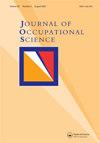Exploring doing activism as a means for political action and social transformation in Germany
IF 2.4
Q1 SOCIAL SCIENCES, INTERDISCIPLINARY
引用次数: 2
Abstract
ABSTRACT Activism is what people do to bring about social transformation. Yet, there is scarce research on activism and its shaping of everyday life in occupational science. Understanding activism as a product of collective doing in specific contexts can contribute to current debates about the political nature of occupation and processes of social transformation through occupation. Therefore, the aim of this study was explore the doing of activism by people in Germany who identify as activists and the ways it influences their everyday lives. An Interpretative Phenomenological Analysis (IPA) was used to analyze data from semi-structured interviews with six individuals living in Germany who self-identify as activists. The analysis focussed on the doing, experiences, and tensions resulting from engagement in activism. The findings are presented through three themes: ‘Doing activism together’, ‘Doing activism versus personal/family obligations’, and ‘Doing activism around the clock’. Together, the findings present a more nuanced understanding of occupations oriented towards social transformation by illustrating how activism can raise awareness of important social issues but also take over participants’ everyday lives and create tensions with their family/work/study priorities and responsibilities. This study enriches current understandings of occupation for individual and society’s social transformation by illustrating how occupation can be used as political expression and action. The findings also contribute to debates about a tendency to focus on the positive nature of occupations, neglecting tensions and potential risks for participants and others.探索行动主义作为德国政治行动和社会转型的手段
激进主义是人们为实现社会变革所做的事情。然而,在职业科学中,很少有关于激进主义及其对日常生活的塑造的研究。将激进主义理解为特定背景下集体行动的产物,有助于当前关于占领的政治性质和通过占领实现社会转型的过程的辩论。因此,本研究的目的是探索德国那些认为自己是活动家的人的激进主义行为,以及它对他们日常生活的影响。解释现象学分析(IPA)用于分析对六名居住在德国的自我认同为活动家的个人进行的半结构化访谈的数据。分析的重点是参与激进主义所带来的行为、经历和紧张关系。研究结果分为三个主题:“一起行动主义”、“行动主义与个人/家庭义务”和“全天候行动主义”。总之,这些发现展示了激进主义如何提高人们对重要社会问题的认识,同时也接管了参与者的日常生活,并与他们的家庭/工作/学习优先事项和责任产生紧张关系,从而对面向社会转型的职业有了更细致的理解。本研究通过阐释职业如何被用作政治表达和行动,丰富了当前对职业的理解,促进了个人和社会的社会转型。研究结果也有助于讨论一种倾向,即关注职业的积极性质,忽视参与者和其他人的紧张关系和潜在风险。
本文章由计算机程序翻译,如有差异,请以英文原文为准。
求助全文
约1分钟内获得全文
求助全文
来源期刊

Journal of Occupational Science
SOCIAL SCIENCES, INTERDISCIPLINARY-
CiteScore
4.30
自引率
41.70%
发文量
46
 求助内容:
求助内容: 应助结果提醒方式:
应助结果提醒方式:


